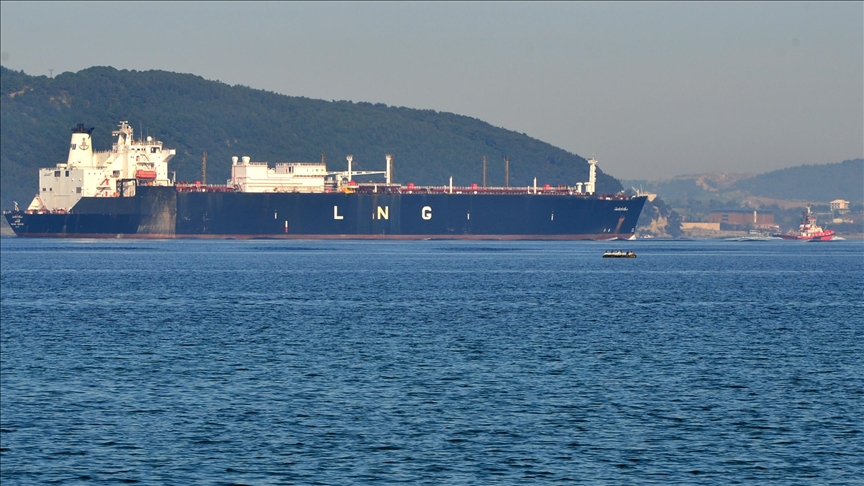 FILE PHOTO
FILE PHOTO
ANKARA
Experts predict disruptions in the Red Sea and Suez Canal because of recent attacks by the Yemeni Houthis rebel group that have forced carriers to avoid waterways, will not carry short-term major consequences but will have long-term political and economic risks
Connected to the Mediterranean by the Suez Canal, the Red Sea is the shortest shipping route between Europe and Asia.
According to the US Energy Information Agency (EIA), oil shipments via the routes accounted for 12% of total seaborne-traded oil in the first half of 2023, and liquefied natural gas (LNG) shipments accounted for 8% of worldwide LNG trade.
In the first 11 months of 2023, around 8.2 million barrel per day (bpd) of liquids, including crude oil and oil products, were transported by vessels moving along the route, energy cargo tracker, Vortexa, revealed in an analysis Wednesday.
Of the 8.2 million bpd, Vortexa data showed 2.9 million bpd is traveling northbound, 3.9 million bpd southbound and the remainder as imports and exports contained within the Red Sea region.
Around 30 tankers pass via the Suez Canal on the northern side of the Red Sea, while 26 use Bab el Mandeb, the southernmost point.
There are around 230 tankers situated within the Red Sea on an average day,155 are loaded and 75 are ballasted.
In terms of the cargo types transported along the Red Sea, Vortexa data showed that crude oil, diesel and jet are the most commonly carried cargoes on northbound oil tankers while crude, residual fuel oils and naphtha on southbound tankers.
Jay Maroo, a lead crude analyst for the Middle East and North Africa region at Vortexa, said Europe has historically been an importer of middle distillate products from the Middle East and India and the flow has picked up, especially for diesel since 2022.
Underlining the importance of flows via the Red Sea, Maroo said volumes of diesel and crude oil sailing northbound have grown sharply on the back of European and US sanctions on Russia.
Maroo said if there is a sustained disruption on Red Sea transits, vessels would have to take longer routes which would increase vessel tonnage requirements but also increase bunker consumption for operating vessels on the laden and the ballast legs, resulting in increased freight costs.
Also, if vessels moved to alternative waypoints such as the Cape of Good Hope, Maroo calculated that the voyage for the main routes affected would increase by at least 58%.
Milder weather in northern hemisphere prevents gas price hikes
“So far, we have seen that some LNG tankers continue to travel through the Suez Canal, including tankers from Qatar, which is the main producer using the Suez Canal to send cargoes to Europe,” said Alex Froley, an LNG market analyst at ICIS, the world’s largest petrochemical market information provider.
Froley told Anadolu that there are tankers changing course to avoid the canal, however, cargoes between the US and Asia would not add a lot of extra days to go around the Cape of Good Hope in Africa than using the Suez Canal.
“It's still quite early to see how things will develop,” said Froley, pointing to companies choosing to avoid the Suez Canal, such as BP, while others continue to use the canal.
Froley said there is not a large amount of disruption to affect the European gas market as Qatar continues to send cargo through the canal.
Due to the current milder November and December months in the northern hemisphere, Froley said European gas storage is sufficient and prices are not increasing.
Prolonged disruptions along Suez Canal may negatively affect fragile Egyptian economy
Francesco Sassi, a Bologna-based research fellow in energy geopolitics and markets at Ricerche Industriali ed Energetiche (RIE), pointed out that “LNG tankers have not been a primary target of Houthi attacks so far.”
“That is either because many tankers transiting northbound the canal come from Qatar, supporting the same faction, or because, politically speaking, US and Russian tankers going to Asia are not easy targets for Houthi and imply broader consequences compared to other vessels,” Sassi told Anadolu.
“Yet, while not carrying any major consequence in the short-term, the disruption of LNG trade through Suez in the long-term carries political and economic risks for global LNG trade,” he said.
The unrest near the Suez Canal comes on the heels of a recent drought that has prompted operators in the Panama Canal, another vital artery in international transportation routes, to reduce the number of ships permitted to use the canal.
Approximately 12% of global trade passes via the Suez Canal, whereas 5% via the Panama Canal.
“As long as the Panama Canal disruption persists, it decreases the arbitrage between Asian and European markets for US LNG, which became the main balance force in the global gas market after the Russian invasion of Ukraine and the crumbling of the EU-Russia gas interdependence,” said Sassi.
“Second,” Sassi added, “it reduces the interconnectivity between the Mediterranean Sea and other basins, while it strengthens the energy interdependence between nations in Southern Europe, Middle East and North Africa which already have gas pipelines and/or trade LNG under long-term contracts, such as Algeria and Türkiye.”
“Third, unless the military task force organized by the US and allies is successful in stopping the Houthi attacks soon, regional exporters of LNG and investors in new liquefaction terminal capacity will carry significant economic and political costs,” he said.
A persistent destabilization of the Red Sea may also jeopardize LNG marketing strategy and the security of their exports, he said.
Pointing to longer delivery times and growing dangers for tankers, Sassi the scenario would significantly increase the costs of delivering Middle East LNG to Europe. “If a cold snap hit Asia or Europe, or both of them during this winter, LNG prices could spike as a consequence of these dynamics,” he said.
Sassi added that the prolonged inability of the Suez to operate also creates critical economic hurdles for the already fragile Egyptian economy.




